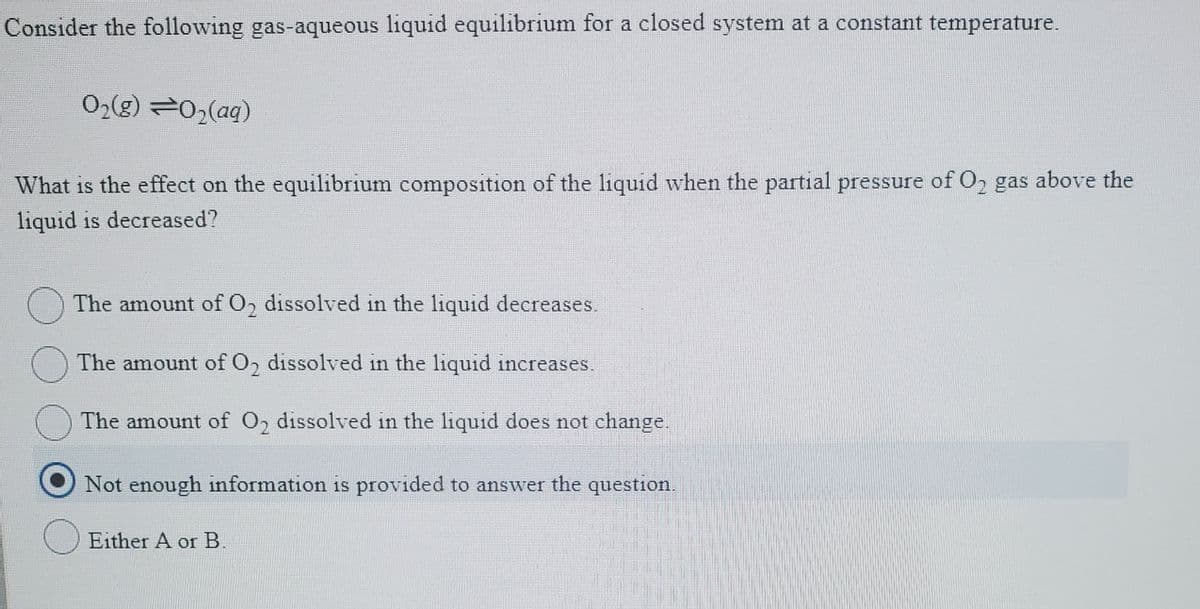Consider the following gas-aqueous liquid equilibrium for a closed system at a constant temperature. 02(g) 02(aq) What is the effect on the equilibrium composition of the liquid when the partial pressure of O2 gas above the liquid is decreased? The amount of O, dissolved in the liquid decreases. The amount of O, dissolved in the liquid increases. The amount of O2 dissolved in the liquid does not change. Not enough information is provided to answer the question. Either A or B.
Consider the following gas-aqueous liquid equilibrium for a closed system at a constant temperature. 02(g) 02(aq) What is the effect on the equilibrium composition of the liquid when the partial pressure of O2 gas above the liquid is decreased? The amount of O, dissolved in the liquid decreases. The amount of O, dissolved in the liquid increases. The amount of O2 dissolved in the liquid does not change. Not enough information is provided to answer the question. Either A or B.
Physical Chemistry
2nd Edition
ISBN:9781133958437
Author:Ball, David W. (david Warren), BAER, Tomas
Publisher:Ball, David W. (david Warren), BAER, Tomas
Chapter5: Introduction To Chemical Equilibrium
Section: Chapter Questions
Problem 5.49E: 5.49. Consider the following equilibrium:
What is the effect on the equilibrium of each of the...
Related questions
Question

Transcribed Image Text:Consider the following gas-aqueous liquid equilibrium for a closed system at a constant temperature.
O2(g) 02(aq)
What is the effect on the equilibrium composition of the liquid when the partial pressure of O, gas above the
liquid is decreased?
O The amount of O, dissolved in the liquid decreases.
The amount of O, dissolved in the liquid increases.
The amount of O2 dissolved in the liquid does not change.
Not enough information is provided to answer the question.
Either A or B.
Expert Solution
This question has been solved!
Explore an expertly crafted, step-by-step solution for a thorough understanding of key concepts.
This is a popular solution!
Trending now
This is a popular solution!
Step by step
Solved in 2 steps with 2 images

Knowledge Booster
Learn more about
Need a deep-dive on the concept behind this application? Look no further. Learn more about this topic, chemistry and related others by exploring similar questions and additional content below.Recommended textbooks for you

Physical Chemistry
Chemistry
ISBN:
9781133958437
Author:
Ball, David W. (david Warren), BAER, Tomas
Publisher:
Wadsworth Cengage Learning,

Chemistry: Principles and Reactions
Chemistry
ISBN:
9781305079373
Author:
William L. Masterton, Cecile N. Hurley
Publisher:
Cengage Learning

Chemistry: The Molecular Science
Chemistry
ISBN:
9781285199047
Author:
John W. Moore, Conrad L. Stanitski
Publisher:
Cengage Learning

Physical Chemistry
Chemistry
ISBN:
9781133958437
Author:
Ball, David W. (david Warren), BAER, Tomas
Publisher:
Wadsworth Cengage Learning,

Chemistry: Principles and Reactions
Chemistry
ISBN:
9781305079373
Author:
William L. Masterton, Cecile N. Hurley
Publisher:
Cengage Learning

Chemistry: The Molecular Science
Chemistry
ISBN:
9781285199047
Author:
John W. Moore, Conrad L. Stanitski
Publisher:
Cengage Learning

Introductory Chemistry: A Foundation
Chemistry
ISBN:
9781285199030
Author:
Steven S. Zumdahl, Donald J. DeCoste
Publisher:
Cengage Learning

Chemistry: Principles and Practice
Chemistry
ISBN:
9780534420123
Author:
Daniel L. Reger, Scott R. Goode, David W. Ball, Edward Mercer
Publisher:
Cengage Learning

Introductory Chemistry: A Foundation
Chemistry
ISBN:
9781337399425
Author:
Steven S. Zumdahl, Donald J. DeCoste
Publisher:
Cengage Learning